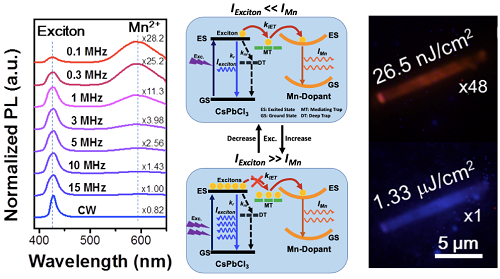The group of Prof. JIN Shengye from the Dalian Institute of Chemical Physics (DICP) of the Chinese Academy of Sciences (CAS) recently reported the excitation-dependent PL tunability from an individual Mn2+ doped CsPbCl3 perovskite microcrystal (MC), realizing a continuous, reversible, wide-range and stable emission color tuning. This work was recently published on J. Am. Chem. Soc.

PL spectra, exciton dynamics illustration and PL images of Mn-Doped CsPbCl3 MC. (Image by SUN Qi)
CsPbX3 (X=Cl-, Br-, I-) perovskites exhibit great application potentials in light-emitting devices because of their stable physical and chemical properties, high PL quantum yield and continuously adjustable band structures, etc.
Previously, researches on the regulation of emission color of perovskites are mainly focusing on controlling the particle size of nanocrystals and adjusting the types and relative proportions of halogen ions. However, among these materials, the fluorescence emission wavelength corresponds to their structures and compositions therefore it is required to change the composition of materials or use multiple kinds of material for emission color tuning, which is inconvenient to practical applications.
The group for the first time reported the synthesis of Mn2+ doped CsPbCl3 MCs showing dual-color PL emission from exciton (blue) and Mn2+ (orange). The obtained Mn2+ doped CsPbCl3 MCs show a continuous, reversible and wide-range excitation-dependent color tuning without changing the chemical composition of materials. Transient spectroscopy and temperature-dependent PL measurements confirmed that the exciton-to-dopant internal energy transfer (IET) in Mn2+ doped CsPbCl3 MCs is mediated by some shallow trap states, rather than through a direct transfer pathway.
Therefore, the saturation of Mn2+ emission is caused by a bottlenecked energy transfer effect by saturating the mediating trap states at high excitation intensities. The Mn2+ doped MCs also exhibit a high photo-stability on the reversible switch of emission color between orange and blue for more than 300 cycles within a continuous operation time of 14 h. In view of the stable and color-switchable emission properties, Mn2+ doped perovskite MCs may find applications in nanophotonic devices with using a single MC.
This work is financially supported by the NFSC, the MOST, and the Strategic Priority Research Program of Chinese Academy of Sciences. (Text by SUN Qi)